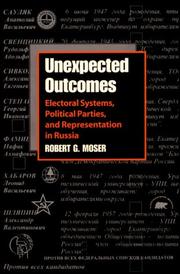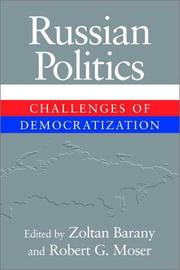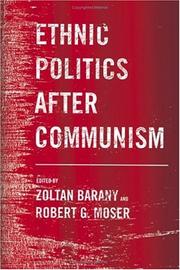| Listing 1 - 7 of 7 |
Sort by
|

ISBN: 0822957469 Year: 2001 Publisher: [Pittsburgh] University of Pittsburgh press
Abstract | Keywords | Export | Availability | Bookmark
 Loading...
Loading...Choose an application
- Reference Manager
- EndNote
- RefWorks (Direct export to RefWorks)
Book
ISBN: 9781139178945 9781107025424 9781107607996 9781139569279 1139569279 1139178946 9781139571081 1139571087 9781139572835 1139572830 9781139572835 1107025427 110760799X 1316090051 1139579657 1107254655 1283715562 113957017X Year: 2012 Publisher: Cambridge Cambridge University Press
Abstract | Keywords | Export | Availability | Bookmark
 Loading...
Loading...Choose an application
- Reference Manager
- EndNote
- RefWorks (Direct export to RefWorks)
Electoral Systems and Political Context illustrates how political and social context conditions the effects of electoral rules. The book examines electoral behavior and outcomes in countries that use 'mixed-member' electoral systems - where voters cast one ballot for a party list under proportional representation (PR) and one for a candidate in a single member district (SMD). Based on comparisons of outcomes under the two different rules used in mixed-member systems, the book highlights how electoral systems' effects - especially strategic voting, the number of parties and women's representation - tend to be different in new democracies from what one usually sees in established democracies. Moreover, electoral systems such as SMDs are usually presumed to constrain the number of parties irrespective of the level of social diversity, but this book demonstrates that social diversity frequently shapes party fragmentation even under such restrictive rules.
Proportional representation. --- Comparative government. --- Comparative political systems --- Comparative politics --- Government, Comparative --- Political systems, Comparative --- Political science --- Cumulative voting --- Representation, Proportional --- Voting, Cumulative --- Constitutional law --- Elections --- Representative government and representation --- Social Sciences --- Political Science

ISBN: 0521801192 0521805120 0231801106 0511814860 Year: 2001 Publisher: Cambridge : Cambridge University Press,
Abstract | Keywords | Export | Availability | Bookmark
 Loading...
Loading...Choose an application
- Reference Manager
- EndNote
- RefWorks (Direct export to RefWorks)
What went wrong in Russia's decade-old post-communist transition? A group of leading young scholars answer this question by offering assessments of five crucial political arenas during the Yeltsin era: elections, executive-legislative relations, interactions between the central state and the regions, economic reforms, and civil-military relations. All of the contributors recognize that adverse historical legacies have complicated Russian democratization. They challenge structural explanations that emphasize constraints of the pre-existing system, however, and concentrate instead on the importance of elite decisions and institution-building. The authors agree that elites' failure to develop robust political institutions has been a central problem of Russia's post-communist transition. The weakness of the state and its institutions has contributed to a number of serious problems threatening democratic consolidation. These include the tensions between the executive and the legislature, the frail infrastructure for successful market reform, and the absence of proper civilian control over the armed forces.
Democracy --- Post-communism --- Démocratie --- Postcommunisme --- Russia (Federation) --- Russie --- Politics and government --- Economic policy --- Politique et gouvernement --- Politique économique --- #SBIB:328H262 --- -Post-communism --- -Postcommunism --- World politics --- Communism --- Self-government --- Political science --- Equality --- Representative government and representation --- Republics --- Instellingen en beleid: Rusland en het GOS --- -Russia (Federation) --- -Politics and government --- -Economic policy --- -Democracy --- -Instellingen en beleid: Rusland en het GOS --- Démocratie --- Politique économique --- 1991 --- Social Sciences --- Political Science --- Putin, Vladimir Vladimirovich, --- Putin, Wladimir Wladimirowitsch, --- Putin, Volodymyr, --- Pujing, --- Poutine, Vladimir Vladimirovitch, --- Путин, Владимир Владимирович, --- Putinas, Vladimiras, --- Putin, V. V. --- Poetin, Vladimir Vladimirovitsj,

ISBN: 0801472768 9780801472763 9780801443770 0801443776 Year: 2005 Publisher: Ithaca London Cornell University Press
Abstract | Keywords | Export | Availability | Bookmark
 Loading...
Loading...Choose an application
- Reference Manager
- EndNote
- RefWorks (Direct export to RefWorks)
Ethnic conflict --- Post-communism --- Europe [Eastern ] --- Ethnic relations --- Political aspects --- Congresses --- Former Soviet republics --- Conflict, Ethnic --- Ethnic violence --- Inter-ethnic conflict --- Interethnic conflict --- Social conflict --- Europe, Eastern --- CIS countries --- Commonwealth of Independent States countries --- Ex-Soviet republics --- Ex-Soviet states --- Former Soviet states --- New Independent States (Former Soviet republics) --- Newly Independent States (Former Soviet republics) --- NIS (Former Soviet republics) --- East Europe --- Eastern Europe
Book
ISBN: 9780521748322 9780521764391 9780511809262 9780511651342 0511651341 9780511593406 0511593406 0511809263 0521764394 0521748321 1107193974 0511698968 9786612393310 1282393316 0511647263 0511592477 0511595336 9781107193970 9780511698965 6612393319 9781282393318 9780511647260 9780511592478 9780511595332 Year: 2009 Publisher: Cambridge New York Cambridge University Press
Abstract | Keywords | Export | Availability | Bookmark
 Loading...
Loading...Choose an application
- Reference Manager
- EndNote
- RefWorks (Direct export to RefWorks)
Can democratic states transplant the seeds of democracy into developing countries? What have political thinkers going back to the Greek city-states thought about their capacity to promote democracy? How can democracy be established in divided societies? This books answers these and other fundamental questions behind the concept known as 'democracy promotion.' Following an illuminating concise discussion of what political philosophers from Plato to Montesquieu thought about the issue, the authors explore the structural preconditions (culture, divided societies, civil society) as well as the institutions and processes of democracy building (constitutions, elections, security sector reform, conflict, and trade). Along the way they share insights about what policies have worked, which ones need to be improved or discarded, and, more generally, what advanced democracies can do to further the cause of democratization in a globalizing world. In other words, they seek answers to the question, Is democracy exportable?
#SBIB:324H71 --- #SBIB:324H20 --- Democracy --- Politieke verandering: modernisatie, democratisering, regional development --- Politologie: theorieën (democratie, comparatieve studieën….) --- DemocracyPolitieke verandering: modernisatie, democratisering, regional development --- Social Sciences --- Political Science

ISBN: 9780511814860 9780521801195 9780521805124 Year: 2001 Publisher: Cambridge Cambridge University Press
Abstract | Keywords | Export | Availability | Bookmark
 Loading...
Loading...Choose an application
- Reference Manager
- EndNote
- RefWorks (Direct export to RefWorks)
Book

ISBN: 9781501720840 Year: 2018 Publisher: Ithaca, NY
Abstract | Keywords | Export | Availability | Bookmark
 Loading...
Loading...Choose an application
- Reference Manager
- EndNote
- RefWorks (Direct export to RefWorks)
| Listing 1 - 7 of 7 |
Sort by
|

 Search
Search Feedback
Feedback About UniCat
About UniCat  Help
Help News
News